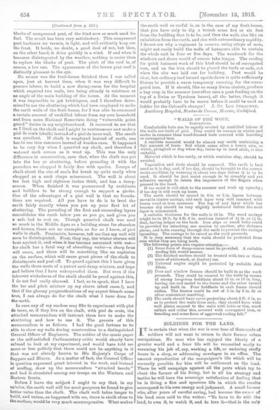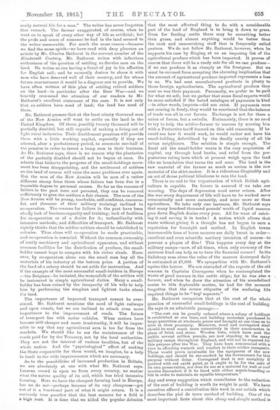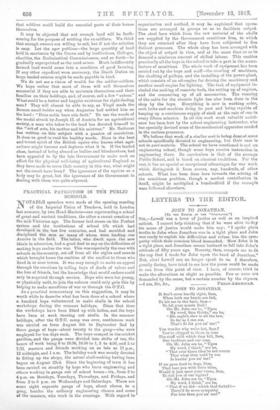SOLDIERS FOR THE LAND.
IT is certain that when the war is over tens of thousands of soldiers will not want to return to their former urban occupations. No man who has enjoyed the liberty of a greater world and a freer life will be reconciled easily to resuming- his job of, say, working a lift, or enduring stuffy hours in a shop, or addressing envelopes in an office. The nearest reproduction of the campaigner's life which will be normally possible for him will be settlement on the land. There he will campaign, against all the pests which try to cheat the farmer of his living, but in all his strategy and tactics he will have the sovereign satisfaction of feeling that he is living at fine and spacious life in which the results correspond to his own energy and judgment. A small farmer who, after years of careful 'saving, had become the owner of his land once said to the writer: "'To have to do with the land; to own ft, fa watch if, and, to love it—that is the only IT is certain that when the war is over tens of thousands of soldiers will not want to return to their former urban occupations. No man who has enjoyed the liberty of a greater world and a freer life will be reconciled easily to resuming- his job of, say, working a lift, or enduring stuffy hours in a shop, or addressing envelopes in an office. The nearest reproduction of the campaigner's life which will be normally possible for him will be settlement on the land. There he will campaign, against all the pests which try to cheat the farmer of his living, but in all his strategy and tactics he will have the sovereign satisfaction of feeling that he is living at fine and spacious life in which the results correspond to his own energy and judgment. A small farmer who, after years of careful 'saving, had become the owner of his land once said to the writer: "'To have to do with the land; to own ft, fa watch if, and, to love it—that is the only
really natural life for a man." The writer has never forgotten that remark. The farmer exaggerated, of course, when he went on to speak of every other way of life as artificial; but the pride and sense of romance he had in the land seemed to the writer memorable. For much the same reason—because we find the same spirit—we have read with deep pleasure an article by Mr. Charles Bathurst in the current number of the Nineteenth Century. Mr. Bathurst writes with infectious enthusiasm of the question of settling ex-Service men on the land. Be writes as one having a fount of joy in his affection fur English soil; and he earnestly desires to share it with men who have deserved well of their country, and for whose future contentment it would be a disgrace not to provide. We have often written of this plan of settling retired soldiers on the land—in particular after the Boer War—and we heartily commend the attention of our readers to Mr. Bathurst's excellent statement of the case. It is not only that ex-soldiers have need of land; the land has need of them.
Mr. Bathurst guesses that at the least ninety thousand men of the New Armies will want to settle on the land in the United Kingdom. Of these, possibly twenty thousand will be partially disabled, but still capable of making a living out of light rural industries. Their disablement pensions will provide them with a little working capital, especially if they are allowed, after a probationary period, to commute one-half of the pension in order to invest a lump sum in their business. As Mr. Bathurst says, there is no reason why the plantation of the partially disabled should not be begun at once. He admits that hitherto the progress of the small-holdings move- ment has been disappointing, and the settlement of soldiers on the land of course will raise the same problems over again. But the men of the New Armies will be men of a rather different stamp from those whose failure has been due in a traceable degree to personal causes. So far as the reasons of failure in the past were not personal, they can be removed sufficiently to give the soldiers a. fair chance. The men of the New Armies will be young, teachable, self-confident, resource- ful, and (because of their military training) inclined to co-operation. The reasons for failure in the past have been chiefly lack of business capacity and training; lack of facilities for co-operation or of a desire for it; unfamiliarity with intensive methods; and difficulties of transport. Mr. Bathurst rightly thinks that the soldier-settlers should be established in colonies. Thus alone will co-operation be made practicable, and co-operation is essential. Without the common ownership of costly machinery and agricultural apparatus, and without common facilities for the distribution of produce, the small- holder cannot hope to compete with his richer rivals. More- over, by co-operation alone can the small man buy all the materials of his industry at the bottom price. A portion of the land of a colony should be set aside for instruction. And if the example of the most successful small-holders in Europe —the Belgians—be imitated, the womenfolk of the settlers will be instructed in simple agricultural duties. Many a small- holder has been ruined by the incapacity of his wife to help hitii by performing the simplest and lightest tasks about the land.
The importance of improved transport cannot be over- stated. Mr. Bathurst mentions the need of light railways and open canals, but we are inclined to attach even more importance to the improvement of roads. The future of transport lies with motor vehicles. When motors have become still cheaper and more trustworthy, it will be impos- sible to say that any agricultural area is too far from the markets. We should like to see the maintenance of the roads paid for by the Treasury, not by the local authorities. They are not the interest of various localities, but of the whole nation. And the "psychological" effect of making the State responsible for them would, we imagine, be a help in itself to the wide improvements which are necessary.
As to the possibilities of increased production in Britain, we are absolutely at one with what Mr. Bathurst says. Lessons crowd in upon us from every country, no matter what the native quality of its soil, which has tried intensive farming. Here we have the cheapest farming land in Europe, but we do not—perhaps because of its very cheapness—get out of it a fractional part of what it might return. It is a curiously true paradox that the best manure for a field is a high rent. It is time that we killed the popular delusion that the most effectual thing to do with a considerable part of the land of England is to bring it down to grass.
Even for feeding cattle there may be something better than grass, and almost anything would be better than
the rank and unnourishing stuff that is frequently called pasture. We do not follow Mr. Bathurst, however, when he
supports his ease by flinging at us an imposing list of the agricultural produce which has been imported. It proves of course that there will be a ready sale for all we can produce— if we can produce it as cheaply as the foreigner. But we must be excused from accepting the alarming implication that the amount of agricultural produce imported represents a loss to us. We had sent manufactured products in plenty to those foreign agriculturists. The agricultural produce they sent us was their payment. Personally, we prefer to be paid for what we sell; but we gather that some fiscal experts would be more satisfied if the hated catalogue of payments in kind —in other words, imports—did not exist. If payment. were not coming in freely, they would be convinced that the balance of trade was all in our favour. Exchange is not for them a union of forces, but a swindle. Fortunately, there is no need to try to help the soldier-farmer to success by nursing him with a Protective tariff framed on this odd reasoning. if he could see how it would work, he would rather not have his small-holding defertilized by the deadly enmity of all his urban neighbours. The solution is simple enough. The fiscal aid the small-bolder wants is the easy acquisition of capital, say through land banks, and relief from the pre- posterous rating laws which at present weigh upon the land like an inundation that turns the soil sour. The land is the raw material of the farmer as much as cotton is the raw material of the shirt-maker. It is a ridiculous illogicality and
an act of dense political blindness to rate the laud.
There is no end to the organization of which British agri- culture is capable. Its future is assured if we take one warning. The days of depression need never return. After the war every department of life will have to be worked more economically and more earnestly, and none more so than agriculture. To take only one instance, Mr. Bathurst saye that many hundred thousand pounds' worth of liquid manure goes down English drains every year. All for want of catch- ing it and saving it in tanks 1 A nation which allows that waste without giving it a thought has not begun to earn a reputation for foresight and method. In English towns innumerable tons of horse manure are daily burnt in ordes--- excellent and even scientific sanitary intention of course—to prevent a plague of flies I This happens every day at the military camps—now, of all times, when only economy of the strictest kind can help us to turn the financial corner In the Salisbury area alone the value of the manure destroyed daily is estimated at £1,000. We sympathize with Mr. Bathurst's squire-like horror. We are reminded of the regrets of the old seaman in Captains Courageous when he contemplated the waste of good manure in the cattle ships; for he was also a farmer, and when he drew the attention of his scandalized mates to this deplorable matter, he had for the moment forgotten that the severe etiquette of the seafaring life required things to be " kap' separate."
Mr. Bathurst recognizes that at the root of the whole question of successful small-holdings is the cost of building. He says in an admirable passage :— " The coat can be greatly reduced where a colony of holdings is established at one time, and building materials purchased in large quantities at wholesale prices and brought at one time on to sites in close proximity. Moreover, wood and corrugated steel should be used much more extensively in their construction in place of brick and stone. Wooden huts, which have cost the public several million pounds, are now standing in the many military camps throughout England, and will not be required for this purpose after the War. They have been constructed with a view to affording warmth and comfort to their soldier occupants, These would prove invaluable for the equipment of the new holdings, and should be ear-marked by the Government for this purpose without delay. Corrugated steel is not unsightly if painted with red oxide paint, as it ought to be for the sake of its own preservation, nor does its use as a material for wall or roof involve discomfort if it be lined with either match-boarding or felt in order to maintain an equable temperature."
Any and every suggestion which contributes to the reduction of the cost of building is worth its weight in gold. We have ourselves offered a contribution this week in our article which describes the pise de terre method of building. One of the most important facts about this cheap and simple method is
that soldiers could build the essential parts of their homes themselves.
It may be objected that not enough land will be forth- coming for the purpose of settling the ex-soldiers. We think that enough owners are willing to sell, but if not the solution is easy. Let the agcr publicus—the large quantity of land held in mortmain by the Crown and by institutions, Colleges, charities, the Ecclesiastical Commissioners, and so forth—be gradually expropriated as the need arises. Much indifferently farmed land would come into a condition of good farming. If any other expedient were necessary, the Death Duties on large landed estates might be made payable in kind.
We do not see a vision of wealth for the soldier-settlers. We hope rather that most of them will call themselves successful if they are able to maintain themselves and their families on their holdings, and, of course, sell a few " extras." What could be a better and happier existence for right-feeling men P They will almost be able to say, as Virgil made the Roman small-holder say when Augustus had settled him on the land : "Dens noble baeo otia fecit." To use the words of the medal struck by Joseph II. of Austria for an agricultural society, a man who takes to the land has devoted himself to the " art of arts, his mother and his mistress." Mr. Bathurst has written on this subject with a passion of conviction. It does its good to read his healthy words. Here is the best and truest spirit of the British squire who knows what agri- culture might become and deplores what it is. If the landed class, instead of being abused as bullies and bloodsuckers, had been appealed to by the late Government to make such an effort for the physical we]l-being of agricultural England as they have made to serve their country in this war, what might not the result have been? The ignorance of the squires as a body may be great, but the ignorance of the Government in dealing with them was quite abysmal.








































 Previous page
Previous page